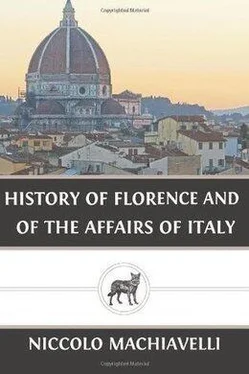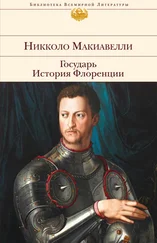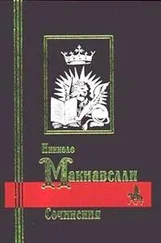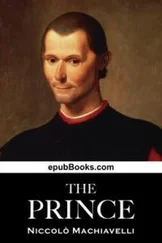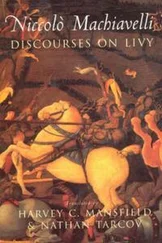History of Florence and of the Affairs of Italy
Niccolò Machiavelli
Niccolo Machiavelli, the first great Italian historian, and one of the most eminent political writers of any age or country, was born at Florence, May 3, 1469. He was of an old though not wealthy Tuscan family, his father, who was a jurist, dying when Niccolo was sixteen years old. We know nothing of Machiavelli's youth and little about his studies. He does not seem to have received the usual humanistic education of his time, as he knew no Greek. [1] Villari, Niccolo Machiavelli e i suoi tempi , 2d ed. Milan, 1895–97, the best work on the subject. The most complete bibliography of Machiavelli up to 1858 is to be found in Mohl, Gesch. u. Liter. der Staatswissenshaften , Erlangen, 1855, III., 521–91. See also La Vita e gli scritti di Niccolo Machiavelli nella loro Relazione col Machiavellismo , by O. Tommasini, Turin, 1883 (unfinished). The best English translation of Machiavelli with which I am acquainted is: The Historical, Political, and Diplomatic writings of Niccolo Machiavelli, translated by Christian E. Detmold. Osgood & Co., Boston, 1882, 4 vols. 8vo.
The first notice of Machiavelli is in 1498 when we find him holding the office of Secretary in the second Chancery of the Signoria, which office he retained till the downfall of the Florentine Republic in 1512. His unusual ability was soon recognized, and in 1500 he was sent on a mission to Louis XII. of France, and afterward on an embassy to Cæsar Borgia, the lord of Romagna, at Urbino. Machiavelli's report and description of this and subsequent embassies to this prince, shows his undisguised admiration for the courage and cunning of Cæsar, who was a master in the application of the principles afterwards exposed in such a skillful and uncompromising manner by Machiavelli in his Prince .
The limits of this introduction will not permit us to follow with any detail the many important duties with which he was charged by his native state, all of which he fulfilled with the utmost fidelity and with consummate skill. When, after the battle of Ravenna in 1512 the holy league determined upon the downfall of Pier Soderini, Gonfaloniere of the Florentine Republic, and the restoration of the Medici, the efforts of Machiavelli, who was an ardent republican, were in vain; the troops he had helped to organize fled before the Spaniards and the Medici were returned to power. Machiavelli attempted to conciliate his new masters, but he was deprived of his office, and being accused in the following year of participation in the conspiracy of Boccoli and Capponi, he was imprisoned and tortured, though afterward set at liberty by Pope Leo X. He now retired to a small estate near San Casciano, seven miles from Florence. Here he devoted himself to political and historical studies, and though apparently retired from public life, his letters show the deep and passionate interest he took in the political vicissitudes through which Italy was then passing, and in all of which the singleness of purpose with which he continued to advance his native Florence, is clearly manifested. It was during his retirement upon his little estate at San Casciano that Machiavelli wrote The Prince , the most famous of all his writings, and here also he had begun a much more extensive work, his Discourses on the Decades of Livy , which continued to occupy him for several years. These Discourses , which do not form a continuous commentary on Livy, give Machiavelli an opportunity to express his own views on the government of the state, a task for which his long and varied political experience, and an assiduous study of the ancients rendered him eminently qualified. The Discourses and The Prince , written at the same time, supplement each other and are really one work. Indeed, the treatise, The Art of War , though not written till 1520 should be mentioned here because of its intimate connection with these two treatises, it being, in fact, a further development of some of the thoughts expressed in the Discorsi . The Prince , a short work, divided into twenty–six books, is the best known of all Machiavelli's writings. Herein he expresses in his own masterly way his views on the founding of a new state, taking for his type and model Cæsar Borgia, although the latter had failed in his schemes for the consolidation of his power in the Romagna. The principles here laid down were the natural outgrowth of the confused political conditions of his time. And as in the Principe , as its name indicates, Machiavelli is concerned chiefly with the government of a Prince, so the Discorsi treat principally of the Republic, and here Machiavelli's model republic was the Roman commonwealth, the most successful and most enduring example of popular government. Free Rome is the embodiment of his political idea of the state. Much that Machiavelli says in this treatise is as true to–day and holds as good as the day it was written. And to us there is much that is of especial importance. To select a chapter almost at random, let us take Book I., Chap. XV.: "Public affairs are easily managed in a city where the body of the people is not corrupt; and where equality exists, there no principality can be established; nor can a republic be established where there is no equality."
No man has been more harshly judged than Machiavelli, especially in the two centuries following his death. But he has since found many able champions and the tide has turned. The Prince has been termed a manual for tyrants, the effect of which has been most pernicious. But were Machiavelli's doctrines really new? Did he discover them? He merely had the candor and courage to write down what everybody was thinking and what everybody knew. He merely gives us the impressions he had received from a long and intimate intercourse with princes and the affairs of state. It was Lord Bacon, I believe, who said that Machiavelli tells us what princes do, not what they ought to do. When Machiavelli takes Cæsar Borgia as a model, he in nowise extols him as a hero, but merely as a prince who was capable of attaining the end in view. The life of the State was the primary object. It must be maintained. And Machiavelli has laid down the principles, based upon his study and wide experience, by which this may be accomplished. He wrote from the view–point of the politician,—not of the moralist. What is good politics may be bad morals, and in fact, by a strange fatality, where morals and politics clash, the latter generally gets the upper hand. And will anyone contend that the principles set forth by Machiavelli in his Prince or his Discourses have entirely perished from the earth? Has diplomacy been entirely stripped of fraud and duplicity? Let anyone read the famous eighteenth chapter of The Prince : "In what Manner Princes should keep their Faith," and he will be convinced that what was true nearly four hundred years ago, is quite as true to–day.
Of the remaining works of Machiavelli the most important is the History of Florence written between 1521 and 1525, and dedicated to Clement VII. The first book is merely a rapid review of the Middle Ages, the history of Florence beginning with Book II. Machiavelli's method has been censured for adhering at times too closely to the chroniclers like Villani, Cambi, and Giovanni Cavalcanti, and at others rejecting their testimony without apparent reason, while in its details the authority of his History is often questionable. It is the straightforward, logical narrative, which always holds the interest of the reader that is the greatest charm of the History . Of the other works of Machiavelli we may mention here his comedies the Mandragola and Clizia , and his novel Belfagor .
Читать дальше
